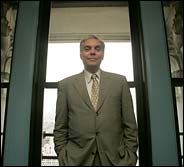Today’s NY Post reported on federal prosecutors efforts to detail accounts of Councilman Larry Seabrook‘s alleged efforts to defraud his Democratic political club and the city.
 This morning’s NY Times coverage of the trial’s proceedings did note the testimony and cross-examination of lawyer and Democratic party insider Stanley K. Schlein (SKS). The Times erred in noting that Mr. Schlein had represented Seabrook in one of his early City Council races. By happenstance, I was in the courtroom for Mr. Schlein’s testimony and the election contest in question was not identified. Mr. Seabrook’s attorney pointed out that Mr. Schlein had represented Mr. Seabrook’s opponent one election before representing Mr. Seabrook in the following election. For the record that opponent was Assemblyman Vincent Marchiselli (1975-1984).
This morning’s NY Times coverage of the trial’s proceedings did note the testimony and cross-examination of lawyer and Democratic party insider Stanley K. Schlein (SKS). The Times erred in noting that Mr. Schlein had represented Seabrook in one of his early City Council races. By happenstance, I was in the courtroom for Mr. Schlein’s testimony and the election contest in question was not identified. Mr. Seabrook’s attorney pointed out that Mr. Schlein had represented Mr. Seabrook’s opponent one election before representing Mr. Seabrook in the following election. For the record that opponent was Assemblyman Vincent Marchiselli (1975-1984).
Mr. Schlein was called as a government witness and was subjected to what seem to me a testy cross-examination by defense attorney Anthony Ricco. There seemed to be a certain level of tension between the two lawyers. Mr. Schlein, whom I have known politically and personally for 30 years, appeared composed and gave “Schlein-like” answers to questions posed by the prosecution and defense.
Federal prosecutors questioned Mr. Schlein for approximately ten minutes, while the defense cross-examination lasted a little over 30 minutes. The feds asked SKS to state his legal work history and his role as outside counsel to the New York Yankees. SKS stated that he has been retained by the NY Yankees since 2005 and paid $10,000 monthly. He was involved with the governmental aspects of building the new stadium and and now provides administrative and labor law consulting to the team. His role involved drafting and negotiating the community benefits agreement (cba) between the Yankees, the City Council and the Office of the Bronx Borough President. Plus, he had a compliance role in overseeing Tishman Speyer and Turner Construction.
SKS testified to knowing CM Seabrook for thirty years. He later acknowledged that they also had a non-attorney-client relationship. Schlein could not recall whether CM Seabrook called him or met him face-to-face to discuss Leon Eastmond’s interest in landing the Yankees boiler contract. SKS recalled touring the Easco boiler plant with CM Seabrook where he said Mr. Eastmond asked for an opportunity to bid on the Yankees contract. It was pointed out by the prosecution that the benefits agreement favored Bronx-based businesses. SKS said he passed on the information to the stadium’s general contractors during one of his regular meetings with them to discuss the bidding process. He testified that he only became aware that Easco had won the contract when Seabrook called to thank him.
Under cross-examination, SKS denied knowledge of the CBA bidding process. He said that the project administrator (Venancio “Benny” Catala) was involved in outreach to local vendors. He also confirmed that the CBA provision requiring 25% community participation (i.e., vendors and workforce). Ricco got SKS to say that then-Bronx BP Adolfo Carrion was supportive of Easco. (I remember Carrion hailing the CBA as a model for future agreements benefiting local communities.)
Ricco pointed out that Benny Catala had worked for BP Carrion prior to becoming the CBA project administrator. In an unclear line of questioning, Ricco sought to assert that Mr. Catala was hired despite being unqualified because the job description required that the project administrator have construction experience.
When asked if other politicians recommended vendors that he would later make referrals to the stadium construction project managers, SKS answered yes. The government’s objection was overruled.
When asked if “unqualified” vendors were hired, SKS answered no.
It was an interesting, if unrevelatory, forty-five minutes of testimony. I wasn’t quite sure what Stanley’s testimony was supposed to establish. Everyone in Bronx politics knows Leon Eastmond and his friendship with CM Seabrook. And Easco boilers are used throughout the Bronx and across the city.
I first met Mr. Eastmond when his company, Easco/A.L. Eastmond & Sons, Inc., was in the federal Small Business Administration 8(a) program and he wanted Rep. Jose Serrano‘s assistance in winning an extension. The particular details escape me but I recall that he presented a persuasive case for receiving an extension. He got the help he sought. In the last ten years, he may have donated once or twice to my campaign committees.
The fact that elected officials refer qualified businesses and individuals for work on public projects is not unusual. Some people have the wrong impression about the “power” of elected officials to get someone a job or a contract. But nonetheless, an elected official is obligated to try to assist constituents legal requests. And if successful, a simple thank you is sufficient and appreciated.
The prosecution claims that Seabrook got “corrupt payments” from Mr. Eastmond for help landing a lucrative contract involving the new Yankee Stadium.
CM Seabrook is also accused of laundering illegal payments from the boiler contractor through his political club, the NE Bronx Democratic Club.
The NY Times’ coverage concluded with another of CM Seabrook’s attorneys, Edward D. Wilford saying that Schlein’s testimony was “a further reaffirmation of the truth” that there’s “nothing wrong with making recommendations.”
Do think the government is making its case against CM Seabrook? Leave a comment below.


Outstanding post however I was wondering if you could write a litte more on this subject?
I’d be very grateful if you could elaborate a little bit more. Thanks!